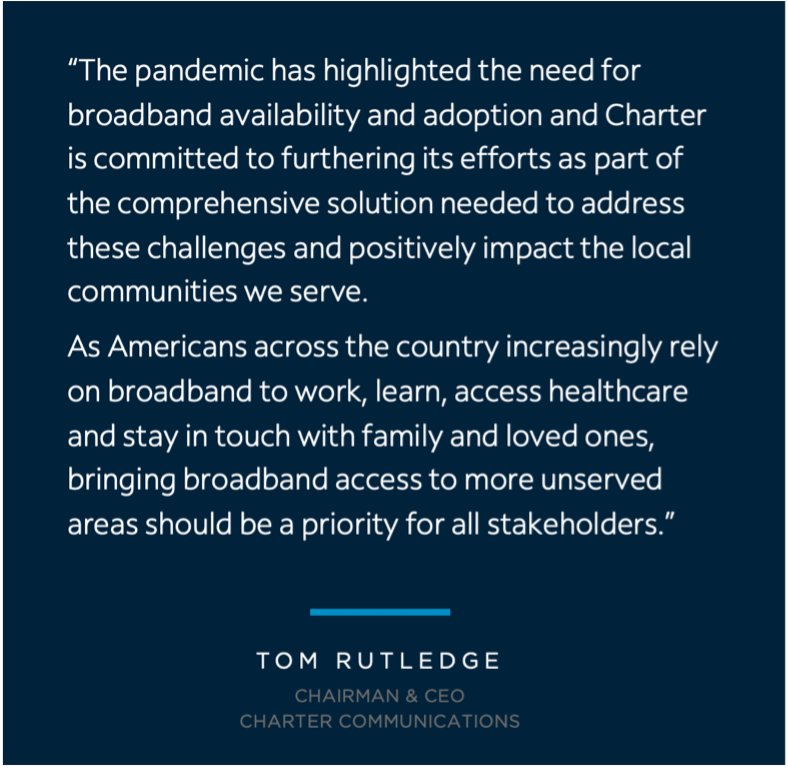Network Investment and Access
A $248 Million Initiative to Expand Broadband Availability to Unserved Missouri Homes and Small Businesses
March 4, 2021
Share Article:
Charter has announced plans to deliver gigabit high-speed broadband to approximately 61,000 unserved Missouri homes and small businesses, as estimated by the Federal Communications Commission (FCC). As part of this effort, more than $248 million will be invested in Missouri, which includes an expected private investment of at least $200 million by Charter and more than $48 million in support won by Charter in the FCC’s Rural Digital Opportunity (RDOF) auction. You can view a map of the Missouri expansion here. The effort is part of the company’s recently announced expected investment of approximately $5 billion — offset by $1.2 billion in RDOF support — to expand Charter's network to what the FCC estimates to be more than 1 million homes and small businesses in lower-density, mostly rural communities across 24 states that do not have access to broadband service of at least 25/3 Mbps.
The new initiative is in addition to Charter’s existing network expansion plans and builds upon the company’s long track record of expanding broadband access to unserved and underserved locations.
State leaders recognize the importance of rural broadband expansion to Missouri’s future. Of the announcement, Gov. Mike Parson remarked, “This investment from Charter and the federal government will deliver new opportunities and greater quality of life for thousands of Missouri families and small businesses that lack access to high-speed broadband. Closing the digital divide in Missouri will make our economy more vibrant, our system of education stronger and equip Missourians with tools that will help them excel in an increasingly digital age.”
“This past year has brought more attention to just how important broadband access is for students, workers, businesses and farmers,” said Sen. Roy Blunt. “Unfortunately, far too many Missourians don’t have high-speed internet or the advantages it provides. I’m glad that this $248 million investment will allow Charter Communications to bring broadband to thousands of farms, houses and businesses across Missouri. I’ll continue to be a strong advocate for federal programs, like the Rural Digital Opportunity Fund, that play a critical role in the effort to expand fast, reliable internet to every community in our state.”
Gigabit Broadband with No Data Caps or Modem Fees
The network Charter will build in these mostly rural areas will offer 1 Gbps high-speed broadband access to all newly served customer locations, with starting speeds of 200 Mbps, enabling consumers to engage in remote learning, work, telemedicine and other applications that require high-bandwidth, low-latency connectivity. These newly served customer locations also will benefit from Charter’s high-value Spectrum pricing and packaging structure, including its Spectrum Mobile™, Spectrum TV® and Voice offerings. Charter will continue to apply its customer-friendly policies in newly served regions, including no data caps, modem fees or annual contracts, combined with high-quality service provided by U.S.-based, insourced employees.

Preparation for the RDOF Phase I broadband buildout has already begun and will include Charter expanding its existing construction organization in order to focus on deployment of this new fiber-optic network. Charter expects to hire more than 2,000 employees and contractors nationwide to support the RDOF and future rural buildout initiatives, including local crews in state for network construction. Charter currently employs more than 6,000 people in Missouri, with employees already earning at least two times the federal minimum wage with a commitment to raising it to $20 an hour next year.
The FCC estimates Charter's major infrastructure investment will ultimately reach more than 1 million households and small businesses and will be completed on a rolling basis, with all customer locations expected to be connected within the six-year compliance window. Charter has established an online resource at SpectrumRuralExpansion.com, where consumers can learn more about the RDOF buildout. In the months ahead, the site will include the ability to determine whether specific residential or business locations will be part of the RDOF buildout. And in the future, the site also will allow prospective customers to request email or text message updates from Spectrum as the buildout progresses and more specific information becomes available. As buildouts near completion, Charter will contact customers to provide details about the Spectrum services available and activation time frames.
Timely Execution Depends on Prompt Permitting and Access to Utility Poles
The timely execution and potential reach of the buildout are dependent on several external factors, including the utility pole permitting and “make-ready” processes. With fewer homes and businesses in these areas, broadband providers need to access multiple poles for every new home served, as opposed to multiple homes per pole in higher-density settings. As a result, pole applications, pole replacement rules and their affiliated issue resolution processes are all factors that can have a significant impact on the length of time it takes to complete projects in these rural areas.
Rutledge added, “The stronger collaboration we have among broadband providers, state regulators, pole owners and utility companies, the faster we can connect these communities with high-speed internet services. We look forward to working with local municipalities, electric cooperatives, and investor-owned utilities to ensure that permits are obtained in a timely, fair and cost-effective fashion.”